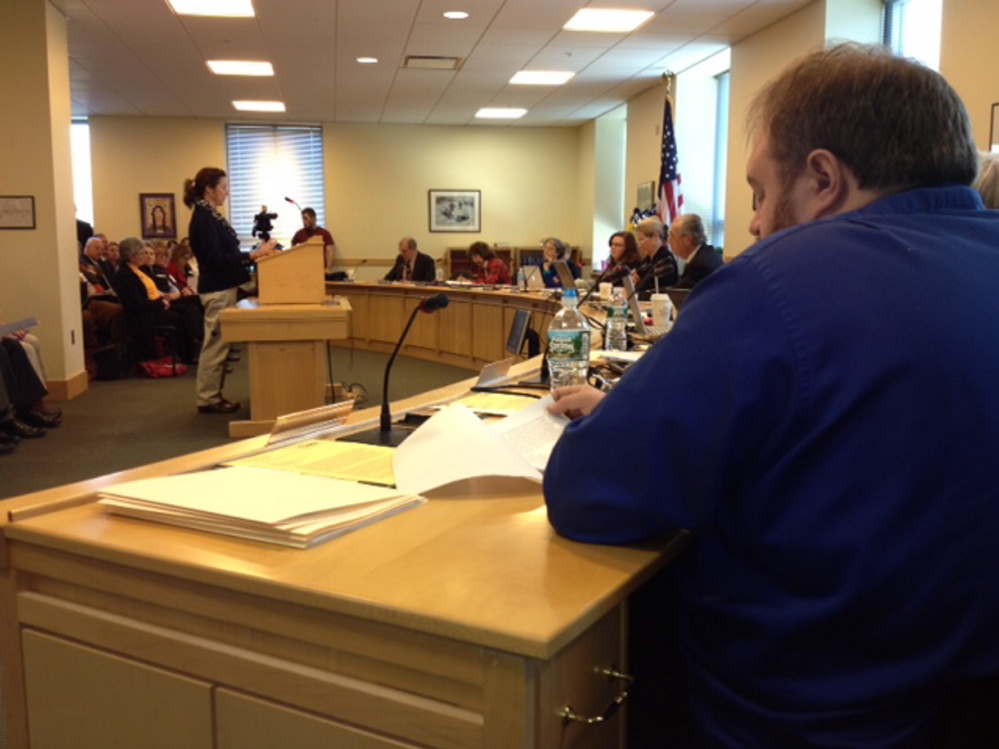AUGUSTA — While supporters and opponents of Medicaid expansion appeared to dig in during a long public hearing Wednesday, Democratic lawmakers said they could be on the brink of gaining enough Republican votes to pass an expansion bill and override an expected veto by Gov. Paul LePage.
A similar bill failed last year when a vote in the House to override LePage’s veto fell three votes short. Just four Republicans voted with the Democratic majority to override the veto.
At least one moderate Republican, Sen. Roger Katz of Augusta, is now seeking ways to draw more Republican votes to expand Medicaid eligibility, which would insure an additional 70,000 to 100,000 Mainers.
“There’s lots of discussions going on inside and outside the State House,” he said. “Stay tuned.”
Rep. Richard Farnsworth, D-Portland, House chair of the Health and Human Services Committee, said he has heard from connected sources that two or three more Republicans may vote in favor of expansion.
He wouldn’t name any Republicans who voted against Medicaid expansion in 2013 but may be willing to vote for it this year, but said, “I believe we are making progress in bringing people along. … There’s room for some additional compromises.”
David Sorensen, spokesman for the House Republicans, said the opposite is true, with more moderate Republicans skeptical of expansion, considering the added costs to the state detailed in a new report by a consultant hired by the LePage administration.
“I wouldn’t be optimistic if I were Rep. Farnsworth,” Sorensen said.
A bill before Farnsworth’s committee incorporates compromises fashioned last year by Katz, including a provision that would end the expansion in three years unless lawmakers vote to renew it.
The Affordable Care Act calls for 100 percent federal reimbursement for Medicaid expansion for the first three years, and 90 percent in subsequent years.
Katz said he is still working on compromises to draw more Republican support while preserving a bill that’s palatable to Democrats. “There ought to be some middle ground,” he said.
Katz said the ideas for compromise are “still in the early stages” so he’s not ready to present them, but they will focus on “core Republican principles.”
In broad terms, he said, he would like to see more “personal responsibility” in the Medicaid system, and he’s examining ways the state could limit Medicaid costs beyond the expansion.
“Other states do a much better job than we do of controlling costs. We could learn from them,” Katz said.
But he said it’s uncertain whether there will be enough votes for an override.
MORE ‘LISTENING’ ON EXPANSION
Jodi Quintero, spokeswoman for House Democrats, said several Republicans have spoken with Democrats and indicated they could be open to voting for a Medicaid compromise.
Sen. Patrick Flood, R-Winthrop, who voted for Medicaid expansion in 2013, said he’s not sure if a compromise plan would attract enough Republican votes for an override, but “I believe a lot of legislators are in listening mode.”
While a U.S. Supreme Court decision in 2012 allowed states to opt out of Medicaid expansion under the Affordable Care Act, several states with Republican governors, including Arizona and Ohio, have agreed to expansion.
A total of 27 states have approved Medicaid expansion or alternative plans, and other states are still debating whether to do so. Some states, including Arkansas and Iowa, have devised complicated workarounds that required federal approval.
A $925,000, taxpayer-funded report issued last week by the Rhode Island-based Alexander Group recommends against Medicaid expansion, saying it would be too costly to the state. The report’s conclusions are widely disputed by Democrats.
COSTS, BENEFITS DEBATED AGAIN
Mary Mayhew, the state’s health and human services commissioner, told the committee Wednesday that an expansion would be too expensive.
“We need a MaineCare program that is not reeling from one financial crisis to the next. We need a MaineCare program that looks to the future,” Mayhew said, referring to the state’s version of Medicaid.
Numerous legislators, residents, advocacy groups and trade association representatives testified Wednesday morning.
Jeff Austin, representing the Maine Hospital Association, spoke in support of the expansion, noting that the federal government has reduced reimbursements to hospitals with the expectation that states will expand Medicaid.
Expanded Medicaid eligibility would provide more paying patients and reduce the number of patients who receive hospital-funded “charity care.”
Many spoke on behalf of the 70,000 to 100,000 low-income Mainers who would gain insurance under the expansion.
Gina Melaragno of Auburn said she lived for four years, in the Channel Islands, where the health care system for low-income residents is much more generous. Coming back to Maine, working a job that doesn’t provide health insurance, she has noticed the difference, especially when prescriptions cost her $250 per month.
But others said that residents should take more personal responsibility for their health care.
Paula Sutton of Warren said she pays a lot for health insurance, while free Medicaid benefits encourage government dependency.
“Health care starts at home, not in Augusta,” Sutton said. “Where do the feds get their money from (for Medicaid)? They get it from you and me.”
Joe Lawlor can be contacted at 791-6376 or at:
jlawlor@pressherald.com
Twitter: @joelawlorph
Send questions/comments to the editors.




Comments are no longer available on this story